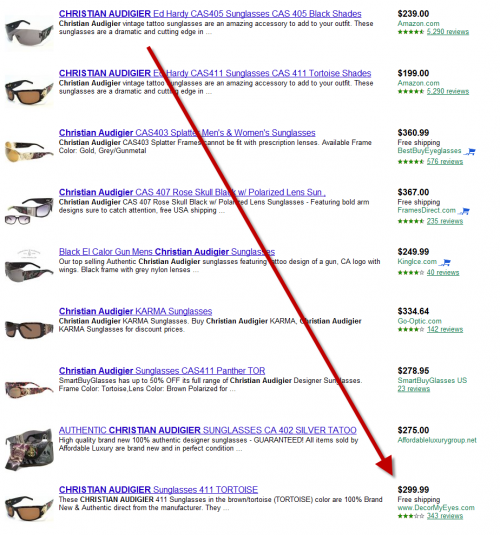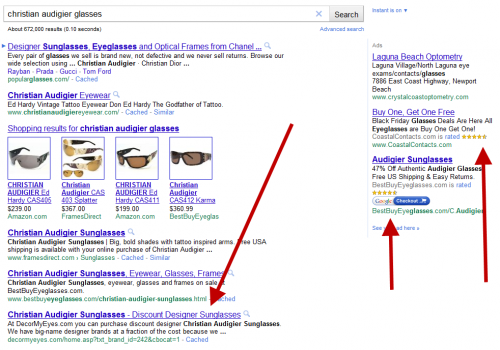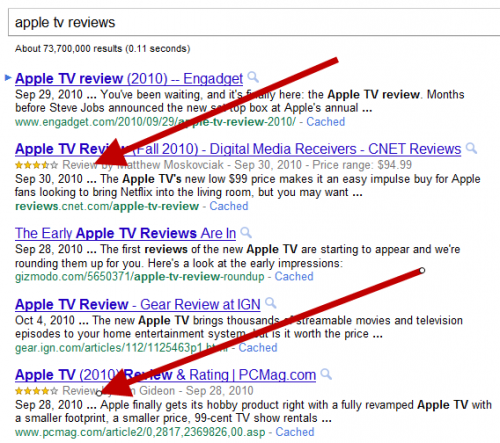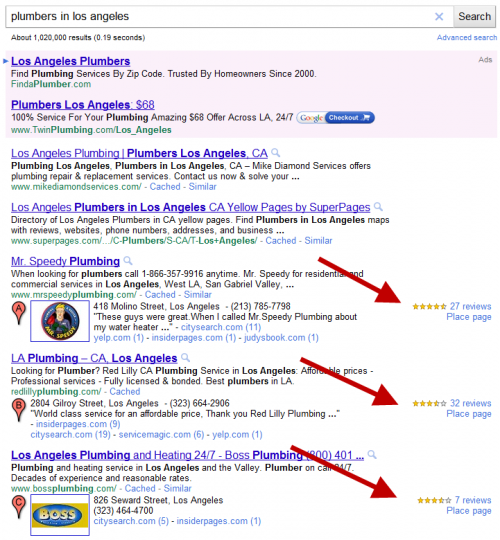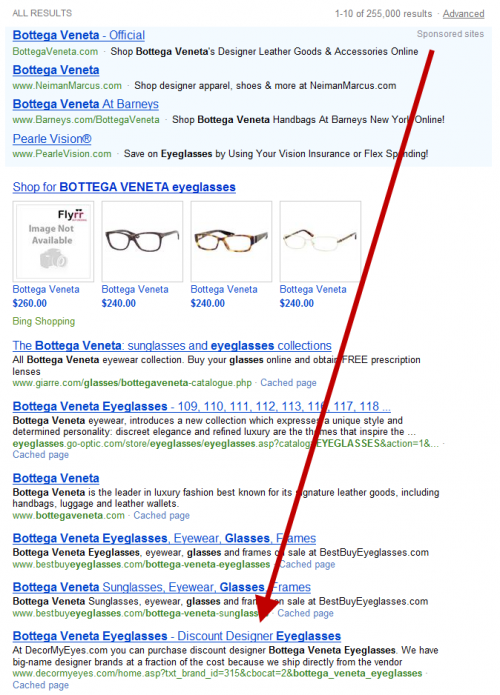Google’s “Gold Standard” Search Results Take Big Hit In New York Times Story
The New York Times has a great, detailed story out today about a merchant with an unusual marketing strategy: be mean to customers. Any publicity, even negative publicity, means a win with Google’s ranking algorithms. Is he right? Maybe. Certainly the story illustrates the fallacy of Google’s “gold standard” search results. Rank Well With Bad […]
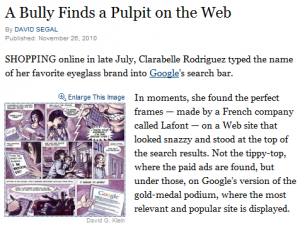 The New York Times has a great, detailed story out today about a merchant with an unusual marketing strategy: be mean to customers. Any publicity, even negative publicity, means a win with Google’s ranking algorithms. Is he right? Maybe. Certainly the story illustrates the fallacy of Google’s “gold standard” search results.
The New York Times has a great, detailed story out today about a merchant with an unusual marketing strategy: be mean to customers. Any publicity, even negative publicity, means a win with Google’s ranking algorithms. Is he right? Maybe. Certainly the story illustrates the fallacy of Google’s “gold standard” search results.
Rank Well With Bad Reviews?
A Bully Finds a Pulpit on the Web is the story by David Segal. It’s long, but be sure to read it. In it, he examines the woeful customer service record racked up by online eyeglasses retailer “Decor My Eyes.” Customers have been treated rudely, hassled by email and phone calls. Police have been called. Credit card companies contacted. But owner Vitaly Borker, speaking amazingly candidly in the article, finds that a key to his success:
“Hello, My name is Stanley with DecorMyEyes.com,” the post began. “I just wanted to let you guys know that the more replies you people post, the more business and the more hits and sales I get. My goal is NEGATIVE advertisement.”
It’s all part of a sales strategy, he said. Online chatter about DecorMyEyes, even furious online chatter, pushed the site higher in Google search results, which led to greater sales. He closed with a sardonic expression of gratitude: “I never had the amount of traffic I have now since my 1st complaint. I am in heaven.”
That would sound like schoolyard taunting but for this fact: The post is two years old. Between then and now, hundreds of additional tirades have been tacked to Get Satisfaction, ComplaintsBoard.com, ConsumerAffairs.com and sites like them.
“Stanley” is an alternative name Borker has used occasionally online. Continuing further in the story, there’s more about how he came across what he claims is his success strategy:
He stumbled upon the upside of rudeness by accident.
“I stopped caring,” he says, and for that he blames customers. They lied and changed their minds in ways that cost him money, he says, and at some point he started telling them off in the bluntest of terms. To his amazement, this seemed to better his standing in certain Google searches, which brought in more sales.
Before this discovery, he’d hired a search optimization company to burnish his site’s reputation by writing positive things about DecorMyEyes online. Odious behavior, he realized, worked much better, and it didn’t cost him a penny.
Can Google Tell The Good From The Bad?
Google declined to discuss with Segal whether it can tell the “good” sentiment about a company from the “bad,” when people talk about a company or maybe link to it. Instead, Google suggested that the reporter talk with me further about it. That’s how I connected with Segal about a month ago.
I talk to reporters all the time about search engine-related issues. One of the delights in talking and emailing with Segal was that he was coming to this situation with fresh eyes. He wasn’t versed in the intricacies of search engine optimization (SEO) or how Google ranks things. He just had this crazy sounding story. Was it true that any publicity is good publicity when it comes to Google? And more important, why would Google want to reward a business like this? As he writes:
Not only has this heap of grievances failed to deter DecorMyEyes, but as Ms. Rodriguez’s all-too-cursory Google search demonstrated, the company can show up in the most coveted place on the Internet’s most powerful site.
Having seen the crazy things that Google will rank high over time, it’s easy to become jaded and think “that’s the way it is.” Many SEOs I know feel this way and have largely given up assuming anything will change, or that Google will take the SEO view of its ranking problems seriously. Heck, Google still won’t let people look up all the backlinks leading to a site, which might allow outsiders to do a better job helping them police their results.
It’s all stuff that can be dismissed as “inside baseball” and not what typical people care about. But typical people do care, do get puzzled, as Segal was as he explored this case. And what Google ranks tops can have a terrible impact on real consumers.
Understanding The “Reviews” Signal
Let me take the ranking issues first. As I’m cited in the story saying, I don’t think Google is trying to determine the good sentiment versus the bad in its web rankings. As I said, there are some reasons why you would NOT want Google to do this:
“If you have a lot of people who hate Obama, for instance, and you decided to rank on love or hate, you might not be able to find the White House and that would be terrible,” he says.
However, Google absolutely can tell if a business has a lot of positive or negative reviews about it. As I explained to Segal, and as is mentioned in his story, you can see this when you do a shopping search on Google rather than a regular web search.
Bad Reviews Shown In Shopping Search
For example, consider this search for christian audigier eyeglasses on Google Product Search:
Decor My Eyes shows on the first page of shopping results, as ranked by “relevancy” (and high on the second page for “christian audigier glasses.” (NOTE: About an hour after I wrote this, as I proofread before publishing, Decor My Eyes was no longer ranking and appears removed from Google Product Search).
Notice the arrow on the screenshot. It indicates that Google knows there are at least 343 reviews about this merchant across the web — and that it has a three-out-of-five star rating. If you click into the review summary page, it’s a mixed picture:
Why Not Use Or Show Reviews In “Regular” Google?
The first key question is why doesn’t Google seem to factor reviews that it collects more heavily into the rankings on Google Product Search. It’s not even an option to manually sort results by ratings. Relevance and price are the only sorting choices.
The second question, and more important question, is why Google doesn’t reflect these reviews when a merchant appears in its regular listings?
Consider this same search on regular Google:
On shopping search, Google associates reviews next to Decor My Eyes. On the far more heavily used regular Google search, it doesn’t — nor does it seem to factor those negative reviews as one of its over 200 ranking signals used by its algorithm to decide what shows up and what doesn’t.
(NOTE: Before publishing, Decor My Eyes was still showing up on regular Google as shown above and below. I’ve seen some reports via Twitter that it has gone. It could be that it has been removed from Google and that this removal has not yet fully hit all of Google’s various computer data centers. Rankings may also change in the future).
When Google DOES Show Reviews
Now consider the regular Google search results for christian audigier glasses below. Decor My Eyes no longer outranks the official web site, as the owner says in the story and as he did when Segal looked at the results earlier this month. However, he’s still in the first page of results (and yes, I’ve verified this to ensure it’s not just Google giving me personalized results). The big arrow points at Decor My Eyes, but notice the ads and the arrows pointing at them:
Those ads have little star ratings next to them. Why? Because Google allows advertisers who want to show ratings next to their ads to do so.
Now consider this search for apple tv reviews (and be sure to read my own Apple TV review posted yesterday!):
See the little star reviews? Those aren’t reviews about the page but rather a way that the authors of those reviews can indicate the star rating they’ve assigned to the products they are reviewing through microformats, to create what are known as rich snippets.
In both cases, with the ads and the rich snippets, Google is allow publishers and advertisers to provide valuable information right within its search results. That’s good, because it allows searchers to make better choices from what’s presented. In fact, Google introduced Instant Previews earlier this month saying it was yet another important way for searchers to get to the right information, faster.
If Google Shows Reviews From Bricks-And-Mortar Merchants….
Ad ratings and rich snippets in Google’s “organic” or “free” or “editorial” results are voluntary things. You wouldn’t expect merchants with bad reviews to enable these. That brings things back to one of the big fails on Google with some of this. Even if it’s too difficult from rewarding a merchant with bad reviews with a top ranking (and it really shouldn’t be), Google could certainly at least make those bad reviews more visible. Consider this search for plumbers in los angeles:
Here, reviews about businesses ARE listed in the search results. They show up regardless of what the business owner thinks. To my knowledge, they can’t be removed. They were added as part of the new Google Place Search that rolled out in October.
Google’s brick-and-mortar local listings have long had relevancy issues. That’s improved over time, and as I told the New York Times, I see these reviews as showing up now as part of Google attending to the “squeaky wheel” of poor local search. Now with today’s focus on shopping search, I’d expect Google to spin round and patch things up there.
Over At Bing, The Same Problem
The New York Times article focused solely on Google. It’s important to note that Google’s chief rival, Bing (which in turn provides results to Yahoo), has the same issues. For example, here’s a search for bottega veneta eyeglasses where Decor My Eyes ranks in the top results:
Over at Blekko, the same search above brings up Decor My Eyes. Interestingly, Blekko-powered Duck Duck Go does not. In fact, the entire decormyeyes.com site appears to have been barred at Duck Duck Go. Good relevancy, if that was done before the New York Times article spotlighted the issue. Not so good if it was done after the fact.
My piece here is focusing on Google for two reasons. First, the New York Times piece does. Second, Google’s the market leader and over the past year or so has aggressively pushed that it has great search quality in a variety of ways, such as public relations and blog posts. That doesn’t excuse Bing from needing to do the same improvements. But similarly, the “Bing has the same problem, too” response won’t wash with me.
Beyond Google: Credit Card Companies
I’ll get back to the search issue in a second, but the story goes beyond the problems just with Google in the case of this particular merchant. eBay hasn’t seemed to have done much policing, in contrast to Amazon, where the merchant says he’s forced to behave “like a boy scout.”
Perhaps most fascinating, or discouraging, were the sections about Citibank in particular and credit card companies in general not cracking down.
As it happens, I’m dealing with Citibank right now on fraudulent purchases made on my card. I’m not worried about getting these refunded, though after reading this article, perhaps I should be. However, I am disturbed at how little the company seems to care to catch the perpetrators. They bought things actually shipped to my house! Crazy. They bought advertising on Google, which means that there might be a route to finding them that way.
My calls to Citibank basically gave me the response of them not being interested. Fraud is just part of their business, even if their business ought to be better protecting consumers and good merchants. Then again, with Citibank, this is a company that seems to have a fictional customer service manager that they’ve maintained for years.
SEO Versus Spam
Ultimately, is Decor My Eyes right? Have all those bad reviews been helping, simply because there are enough links pointing at the site regardless? As I said, maybe. I took a cursory lookup last month (you can bet several SEO blogs will be doing detailed looks to come). Nothing immediately leapt out as a reason for the site to do well. When I looked with Segal last month, I found some sites that were worse than Decor My Eyes, in terms of content presented, that still were being ranked well by Google.
From an SEO perspective, I still wouldn’t advise anyone to follow this strategy. For one thing, who wants to be that type of a merchant? For another, in the long term, I still think the bad reviews will catch up to you. As with local listings, I think Google will begin showing online merchant reviews right within its results.
Of course, that will further open up the gaming that already happens in those reviews, as well as concerns that businesses might be hurt by fake negative reviews. No doubt, we’ll have warnings that you shouldn’t buy reviews. Maybe we’ll even have ways to “nofollow” reviews that aren’t trusted, in the way sites can “nofollow” links and ask they don’t carry credit with Google through its PageRank and link analysis systems. Won’t that be fun.
However, the more immediate concern remains why Google would have rewarded a merchant like this, right now, with its existing systems. The answer is that Google’s ranking systems are far from perfect. You get a few good matches, and that satisfies many people. But some poor quality sites still get rewarded. This isn’t about pulling spam, because a bad merchant doesn’t necessarily equal a merchant that’s spamming Google. This is about Google actually doing what Google is supposed to do. Ensure that only the best things show up in the top of its results.
Will Google Fix It Now?
I’ve covered what I’ve perceived as a decline in Google’s search quality twice now in the past year, talking about how things get into the top results that aren’t up-to-snuff. I’d encourage you to read them
- Reviewing Some Bad Google Search Results With Sergey Brin
- How The “Focus On First” Helps Hide Google’s Relevancy Problems
Others in the SEO space have also seen it, as well, where Google seems to tell site owners one thing but the reality of the search results says something else.
Here’s hoping that having its failure splashed across the pages of the New York Times will get Google to do more.
For related commentary on this topic from across the web, see here on Techmeme.
Postscript: In my story above, I realize in the end that I didn’t dwell much on the aspect of whether the links — in good comments or bad about the site — really did count for much. I might come back to take a deeper look at this later. But for now….
Get Satisfaction has a post up explaining that in their reviews, links are “nofollowed.” As I explained above, this is a way for a site to indicate to a search engine that it doesn’t “trust” a link or vouch for it, and thus doesn’t want that link to gain credit with ranking systems.
I’ve now looked at several of the other review sites mentioned in the New York Times article, such as Complaints Board, ConsumerAffairs.com and Ripoff Report, along with a few others. They all seem to nofollow links, to ensure the sites reviewed aren’t gaining credit. Ironically, Ripoff Report especially stands out among the crowd as a site that has its own bad reputation, making some think it should be removed from Google.
Of course, there are many “scraper” sites out on the web, sites which copy content from one site and create mishmashes usually to rank on Google and often tap into AdSense money from Google. If they copy from some of these review sites, it’s possible that the nofollow part of links might be dropped off.
As I said in this piece and in the New York Times article, “maybe” those bad reviews helped Decor My Eyes. It’s possible, and I didn’t spend much time trying to debunk that portion, hence my maybe.
Why not spend more time on that aspect? For one reason, it’s just a stupid SEO strategy, to me. Being a bad business to your customers really doesn’t seem a long-term business model, even if it MIGHT bring in some Google traffic
More important, most of my time talking with the New York Times and in this piece was spent focusing on what I thought was the bigger issue. Could Google tell what someone thought about an online merchant — if it was reputable or not? I think many would agree that if Google could do this, that would be an important factor to weigh in its ranking algorithms.
I think it’s clear that Google CAN do this, given that it collects reviews and aggregates star ratings for shopping search. But it appears not to let this influence how well a site can rank in either shopping results or its regular results. And in its regular results, it doesn’t to show aggregate reviews at all.
Google recently found it important to show all searchers Instant Previews of web sites but hasn’t found it important to show aggregate reviews of online merchants? That’s a fail, to me.
Postscript 2: Today (Monday), I had a closer look at some of the places linking to Decor My Eyes. In particular, I used SEOmoz’s Open Site Explorer to do a backlink lookup. I was surprised to see that Get Satisfaction was listed in one case as providing a link that does carry credit to the site. It’s on this page. That’s not the same as every review link carrying credit. Each review, bad or good, doesn’t add more credit. But yes, by being on Get Satisfaction at all, that site is transmitting some authority to Decor My Eyes. Reseller Ratings has another example of this.
Postscript 3 (Dec. 1): No, You Can’t Rank Well Just By Cultivating Terrible Reviews from Search Engine Land today looks further at how review links to the merchant didn’t really help.
More important, Google has now also announced that merchant reviews will be part of its ranking algorithm, to keep merchants with bad reputations from appearing. Google: Now Using Online Merchant Reviews As Ranking Signal has more about that.
Postscript 3 (Dec. 6): See DecorMyEyes Merchant Vitaly Borker Arrested After NYT Piece On Google Rankings.
Contributing authors are invited to create content for Search Engine Land and are chosen for their expertise and contribution to the search community. Our contributors work under the oversight of the editorial staff and contributions are checked for quality and relevance to our readers. The opinions they express are their own.
Related stories
New on Search Engine Land
